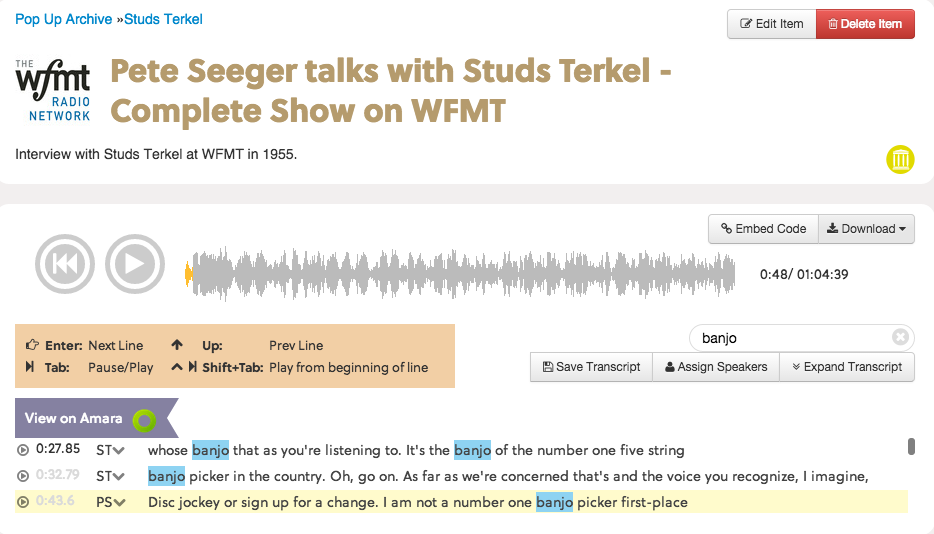
Making sound searchable, many voices at a time
Anne Wootton and Bailey Smith are co-founders of Pop Up Archive, a winner of the 2012 Knight News Challenge: Data and one of the companies in the portfolio of the Knight Enterprise Fund.
Since we launched Pop Up Archive in 2013, we’ve made almost 1 million minutes of sound searchable. This is just the beginning.
A question we ask ourselves a lot at Pop Up Archive.
In the past year, we’ve helped hundreds of radio producers log raw tape, get audio stories online faster, and optimize their stations’ sites for search engines. We’ve worked with the Hoover Institute at Stanford to index interviews with founders of the Communist Party, processed thousands of hours of sermons for the Princeton Theological Seminary, and helped WFMT and the Studs Terkel Digital Archive catalog Terkel’s 40 years of radio interviews with everyone from Janis Joplin to Shel Silverstein. We’re experimenting with some of the most innovative digital media properties to make sure that audio and video content are indexed by Google and just as easily found and shared on the Web as text. Anyone can search over 10,000 public audio items at Pop Up Archive.
Over the summer of 2014, advised by the BBC research and development team and the International Computer Science Institute in Berkeley, Calif., we developed speech-to-text software designed specifically for news and oral history audio. Our efforts seem to be paying off: 90 percent of our speech-to-text pilot customers this summer converted and became recurring monthly Pop Up Archive users. As KQED Vice President of Digital Media and Education Tim Olsen puts it, “Pop Up Archive has significantly reduced the time it takes KQED to turn an audio story into a text feature for the Web, not only extending the life of the story, but its discoverability via search and social as well.” We’re having fun.
You might have heard recently that digital audio is having a moment. Perhaps it’s not virally inclined, but audio storytelling is crossing over from niche to mainstream. In 2012, 40 percent of Americans listened to digital audio. That number is projected to double by 2015.
PRX’s podcast collective, Radiotopia, just raised over $600,000 on Kickstarter. Planet Money producer Alex Blumberg and his business partner Matt Lieber announced last week that they secured $1.5M of investor capital for a podcast network startup. Over a million people, many first-time podcast listeners, consume each episode of “Serial,” the investigative reporting podcast from producers of “This American Life.” If Buzzfeed is parodying it, they must be doing something right.
Pop Up Archive had a strong showing at 500 Startups Demo Day in July (more news on that soon). And we just got back from the Third Coast Festival in Chicago, where over 550 audiophiles gathered with more palpable, electrifying potential than we can ever remember.
Today, we’re insanely excited to release a slew of new features built specifically for our active, growing community. You should head over to popuparchive.com to check it out for yourself — but here’s a quick summary:
-
Pay-as-you-go by the hour (or join a monthly plan) for premium machine transcripts tailored specifically for media and oral history audio.
-
Premium transcripts include speaker differentiation and punctuation — and you can edit speaker names to add to a growing database of the voices in your audio.
-
Data visualization tools show patterns and trends across audio collections.
Our vision is even broader than that. We’re starting to analyze the data we capture about the spoken word — whether to compare the speech of Oakland mayoral candidates or measure changes in the vocabulary used by news media to discuss climate change over the past decade. We’re helping journalists log dozens more hours of tape than they could ever hope to transcribe themselves — and we’re helping listeners find the best moments in their favorite podcasts. How would you like to analyze audio? We want your suggestions.
We also want to thank everyone who’s helped so far — in particular, Knight Foundation, the National Endowment for the Humanities, Bloomberg Beta and our families at PRX and 500 Startups.
You’ll be hearing from us again soon. Until then, see you in the archive!
Recent Content
-
Journalismarticle ·
-
Journalismarticle ·
-
Journalismarticle ·




